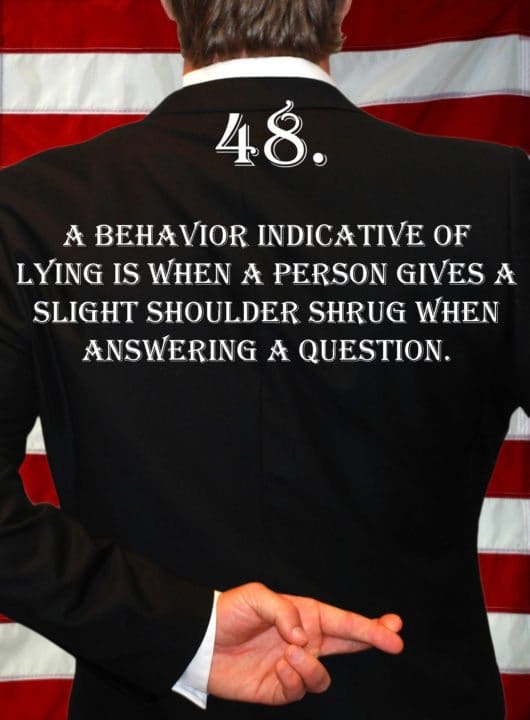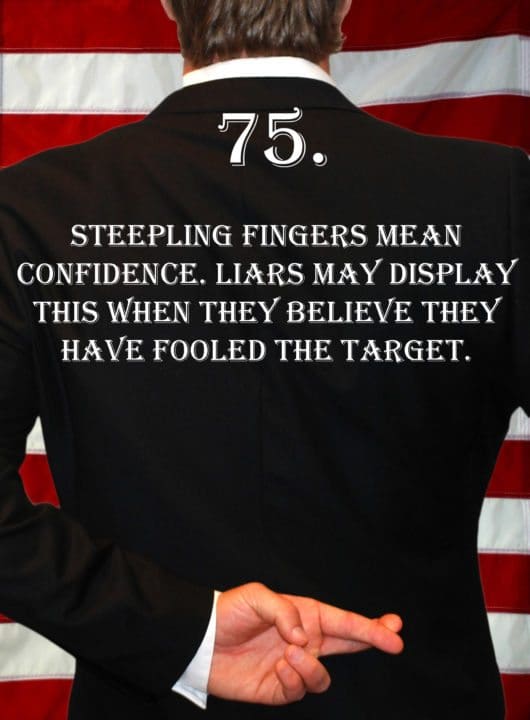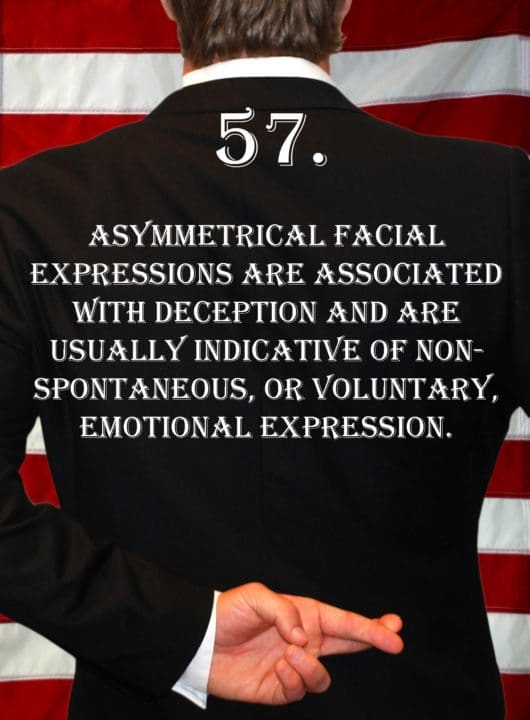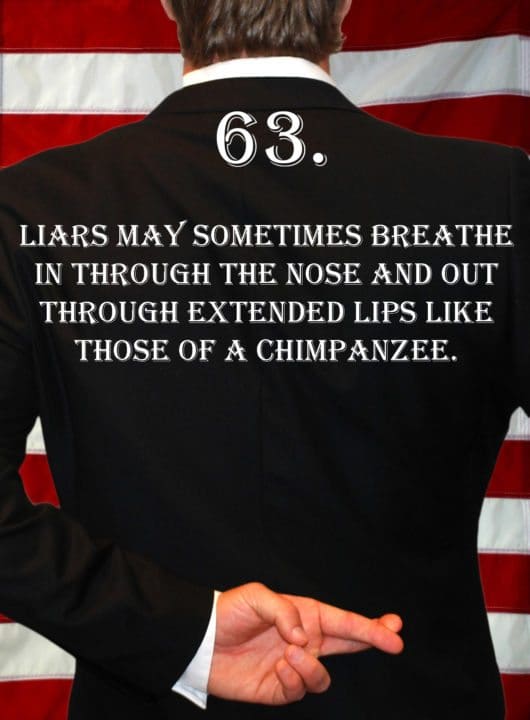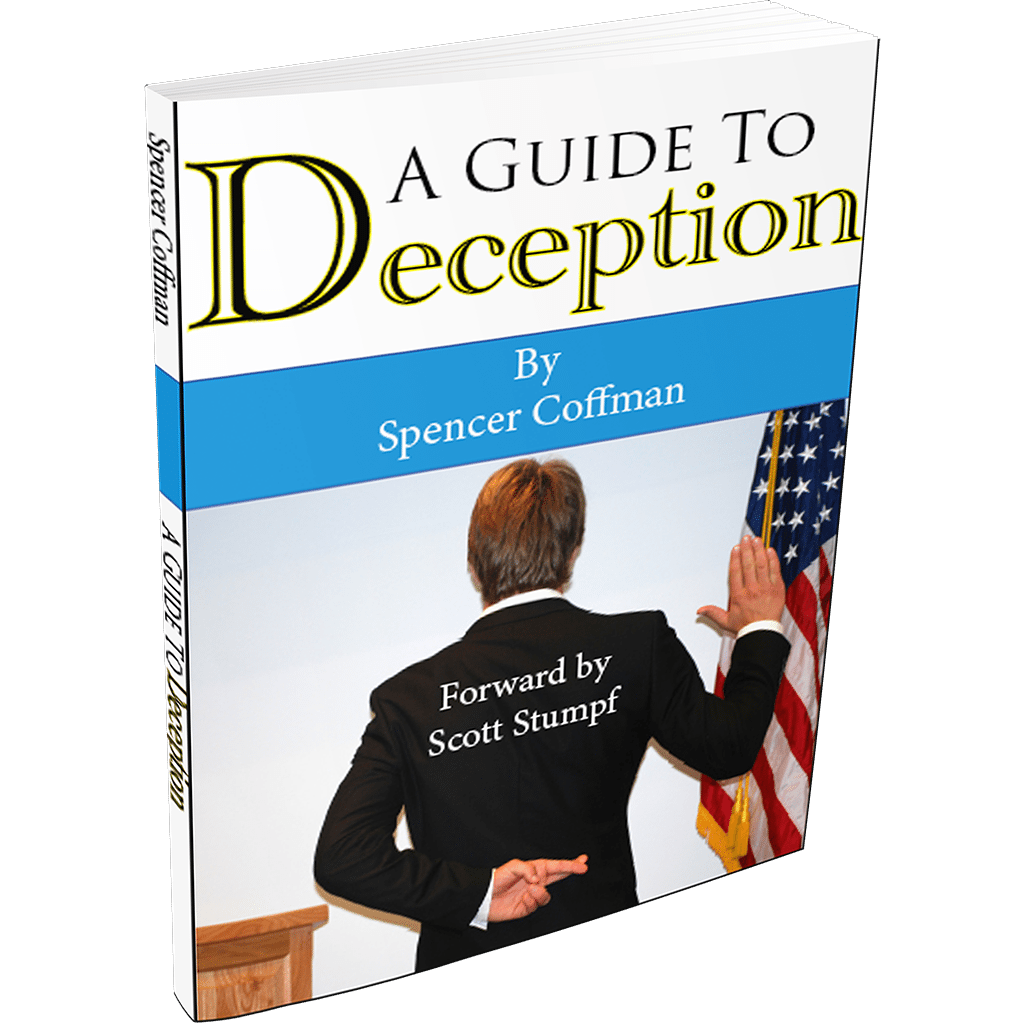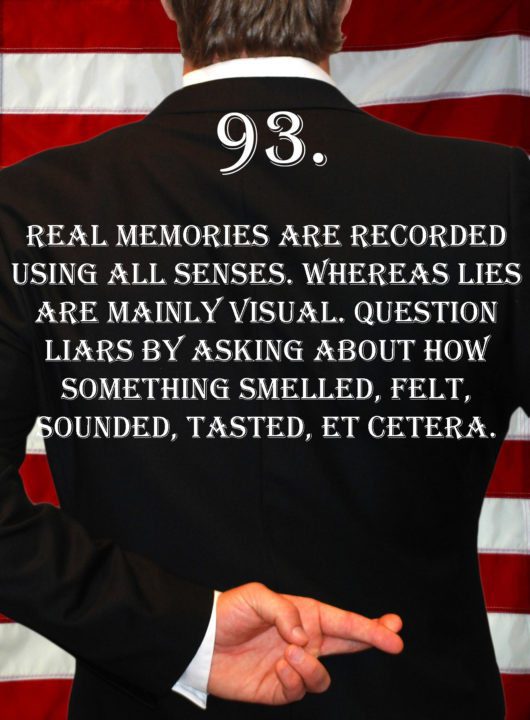
Deception Tip 93:
Real memories are recorded using all senses. Whereas lies are mainly visual. Question liars by asking about how something smelled, felt, sounded, tasted, et cetera.
Listen To The Podcast!
E93 – Real Memories – Deception Tips Podcast – Click Here To Subscribe
Podcast Transcript
Hello and welcome to the Deception Tips podcast, where you will learn amazing cues to detect deceit that will help you read people like never before. I’m your host Spencer Coffman, let’s get started.
Hello and welcome to episode 93 of the Deception Tips podcast. Last time, we spoke about a tip that is something inherent in human nature, that people are motivated to avoid negative outcomes.
We want to avoid pain and seek pleasure, it looks like Freud was right after all. For those of you who aren’t Freudians, well, he still was right, avoid pain, seek pleasure, that is what people are motivated to do.
We want to avoid negative outcomes and when people lie, what are they doing? If they’re lying to avoid something, to get out of something, to get away from a consequence, or to cover something up, they’re avoiding a negative outcome. When you realize that you’re about to get caught when you’re lying if someone offers you a way out or a route of less punishment, you will be more apt to take it.
The reason is that if someone is lying to cover something up or to get away from a consequence and then they’re about to be caught, now they’re going to face that consequence and they’re going to face the consequence of lying. If someone says, ‘hey, look, I’ll reduce that’, that’s going to be a really good deal and they are going to want to take it.
People are motivated to avoid the negative outcomes to seek less punishment, to take the least worst scenario or the lesser of two evils. They want the best thing for themselves possible. Therefore, when you’re catching a liar or when you are about to get someone who’s tripped up in their lie, use that to your advantage.
Offer them a different solution or a way out or a better consequence and give them those choices if they tell you the truth. We talked about this a little bit in Accusing Liars in episode 26, with accusing liars of a greater crime to get them to fess up to a lesser crime.
If you accuse them of something greater, with more consequences, they may be scared of that consequence. They may admit to whatever it is that they did do to get the lesser of the two consequences, to make sure that you know that they are not going to be receiving that terrible consequence or that huge consequence.
‘No, no, no, wait a minute, I didn’t kill anybody, I was only there stealing’. ‘Oh, so you were there.’ You frame them or set them up for something else to get them to admit to the lesser thing.
Obviously, you’re not going to do that on a frame job or if you know they didn’t do it. You’re only going to use this tactic on people who you are pretty certain are lying about something.
You’re going to use this to get them to tell the truth, you’re not going to set anybody up or frame them illegitimately or illegally. This is setting someone up for something else to get them to admit to what you know they did, you’re not going to just try to get people to admit to a crime, to close a case or something that’s unethical and immoral, don’t do that.
Today, we are going to talk about a tip that involves how people think and how they record memories and what they will speak them back to you like. How you can help them refresh their memory or jog their memory when they’re telling a lie. This is important because you want them to become as truthful as possible.
Therefore, if you start to refresh their memory on things or ask them certain questions that relate to memory instead of to whatever they’ve invented, they will be more apt to answer truthfully. The reason is that if you start asking questions that are direct to memory then when they respond, it’s going to be almost like an instant or a reflex of response.
It may not be instant because they may have to think about it but the response will be more truthful because it’s coming from memory rather than fabrication. This is very important, it is a tip that you are going to want to use all the time in your line of questioning.
Over the past episodes, we’ve discussed a few other tips that are related to memory and how people tell stories, and how memory works. For example, in episode 17, Detailed Stories, liars like to have a lot of detail but memory is more vague and flawed and it goes back and forth and they remember things as they go. If you ask these specific questions into memory, you’re more apt to get a truthful response.
So, here it is, this is Deception Tip number 93. Real memories are recorded using all senses whereas lies are mainly visual. Question liars by asking about how something smelled, felt, sounded, tasted, etc. Here it is again, Deception Tip number 93. Real memories are recorded using all senses whereas lies are mainly visual. Question liars by asking about how something smelled, felt, sounded, tasted, etc.
So, real memories are recorded using all of your senses, which means you’re going to know in a certain situation or circumstance when you’re there. You’re going to remember how things smelled, how they felt, how did it sound around you? What did it taste like? Maybe you didn’t taste anything but what did the air taste like or when it smelled, what did that smell taste like?
You can still taste things even though you’re not eating, You will have an idea of the taste or the flavor. It was dusty, it was like pollen or it was like oranges, you’ll have these feelings or these tastes in your mouth even when you’re not eating something. In addition, you’re going to know, was it warm, was it cold, how did your body feel? Did you get goosebumps, was it scary?
You could be blindfolded but you could still have all of these different feelings and sensations from the environment around you or that you were in. Therefore, when you question people, if you question their senses and you ask questions specifically targeted toward these things, you will have a much better idea of whether or not they’re telling the truth.
Liars rehearse lies in their minds or they play them out in their minds, so when they’re concocting this lie, It’s all visual for them. They’re not thinking about what it might smell like or taste like or sound like because their primary goal is coming up with this lie that they will tell that people will believe. They are also trying to convince themselves of the lie, so they’re not thinking about all of these other senses.
Therefore, if you ask them questions related to these senses and they’re trying to lie, they’re either not going to have a good answer for you or they’re going to answer and it’s not going to be related to their lie.
You’ll know something is up because you’ll see a contradiction and you’re going to be like, ‘wait a minute, it felt like this, but I thought you said it was freezing cold and you’re saying you felt hot, what’s going on?’
They’re going to have to think up an excuse and whether or not you’re satisfied with that excuse, who knows, but you will find these loopholes and these contradictions in their story by questioning the senses. We’re going to talk a lot more about the different senses and how they play into memory and lies and truth coming up right after this.
Want to be a human lie detector but don’t have the brains or the guts to do it? We understand, that’s why we created the Deception Tips blog, especially for you. Check it out today on spencercoffman.com.
Welcome back to Deception Tip episode number 93, where we’re talking about real memories and how they’re recorded using all of the senses. So, when someone is telling their story, they’re not really speaking about all the senses but if you ask questions that are directed towards those senses, you’re going to get answers that match their story.
However, if someone is lying, they didn’t obviously go through that experience because it’s a lie, it’s fake. Therefore, if they didn’t live through it, they haven’t recorded memories about it, so they don’t know how it may have sounded or smelled or felt or tasted. They only know what they think it should look like or how they think it played out.
Why? It is because it is a fake, visual memory, they’ve concocted it up in their heads, they’ve got their story, they’re really focused on making sure they tell it correctly. They’re focused on making sure you believe it, they’re focused on convincing themselves it’s true so that their unconscious and conscious aren’t battling so much so that there isn’t so much stress and tension inside of them.
In addition, they are focusing on getting out of or away from that consequence. So, if you think someone may be lying, you can simply question them based on their senses. It’s also a good practice to question them on their senses anyway because when we are telling a story or speaking, we’re not usually telling people how it smelled or sounded or tasted unless we’re talking about food.
Normally, when you’re telling a story of your experience, you’re telling people how it played out, what it looks like, and all the different things that you did and went through.
You’re not really telling them all of the different senses you had or the stories about the senses. It’s only when we read books that we get that sensation visual so that it’s almost like we can imagine it and picture it in our minds, we don’t speak like that on an everyday basis.
So, when you’re telling a story to someone or when someone’s telling a story to you, think about that, pay attention to that and see how many times they talk about sensation to give you a more complete visual and imaginative picture of exactly what’s going on, it’s not many.
Therefore, when you’re talking to people, feel free to question them based on their senses. ‘Wow, that sounds so cool, what did it sound like’ or ‘what did it feel like under your feet? What did it smell like around there?’ Ask them these questions, they may think you’re a little strange or they may think it’s a weird question but you know what, they’re going to think it’s a good question.
Why? Because no one else asks it, so there’s a tip for conversation for you, use these in conversation. You’re going to look a lot more socially elevated than the other people around you because you have the wherewithal to ask deeper questions. In addition, if they’re lying, you’re going to know that there’s something funny, you’re going to call out that lie or you’re going to know that there’s a lie.
They may not know the answer, they may give you a bogus answer or you may realize that there’s a contradiction there. Based on their story, they should have smelled, tasted, heard, and all sorts of stuff because maybe you’ve gone through a similar experience but the stuff that they came up with doesn’t match the story.
You can use this in speaking with people who you’re not trying to find lies with, you’re just doing it in normal conversation and it will deepen the conversation. You can do this when you are questioning and interrogating someone who may be lying to try to get deeper into their story, to understand more of what’s going on and whether or not they really are telling the truth.
This is important, remember memory isn’t perfect, memory is something that we go through in life and it’s stored. It’s not like a nice computer where you’ve got all your files in perfect little folders and you can just search and find every little thing. No, memory is more like a cluttered closet or an attic, it’s something that you have everything thrown in there and it’s in the dark.
Yes, you do have file folders, the schema, the little file folders of our brain but the lights are off, there aren’t any lights up there. You’re wandering through the dark and all you can find are the big things, the clunky things that you run into, big, important stuff.
Maybe it’s the day you got married or your grandmother’s birthday or things like that, the stuff you don’t really need at that time. When you’re looking for something you need, it’s tough to remember, why can’t I remember it, it’s on the tip of my tongue, it’s because memory is imperfect.
A day later, you may remember it when you’re going to bed or it just comes to you. Why? Well, because memory is imperfect, it remembered you wanted to remember that thing, so it was looking for it. A day or two later, your unconscious found it and serves it up to your conscious, it’s imperfect.
So, when people are telling these stories, they may forget certain details and we talked about that in Detailed Stories, liars will have a lot of details. When you’re questioning people, ask these questions that probe deeper into their memory so that you’re stimulating the unconscious to go find these answers. Why? Well, because the unconscious is always truthful.
If you were probing or directing questions toward the unconscious instead of the conscious, guess what, you are more sure to get a truthful response because the unconscious is always truthful. Therefore, direct your questions toward the unconscious, use questions based on sensation and things that are deeper in your everyday conversations to practice, and pay attention to it.
I want to thank you for listening to this week’s episode of the Deception Tips podcast. I hope that you’ll share it with your friends, subscribe to the feed, take a look at the Deception Tips videos, the blog and the books that I have available, and, as always, tune in next week for a new deception tip.
Video Transcript
Hey guys, my name is Spencer Coffman, thank you for watching the deception tips videos. They’re all about teaching you how to read people and detect deception so that you will be able to tell if someone is lying to you. Today, we’re going to talk about a technique that you can use. It’s more of a strategy, an interrogation strategy, that you can use based upon a person’s memory and how the mind works encoding data and making memories.
You’re going to learn a little bit about how the brain forms these memories and how it retrieves them and how you can use that information to your advantage when someone is telling you their story. So, here it is, this is Deception Tip number 93. Real memories are recorded using all senses, whereas lies are mainly visual. Question liars by asking them about how something smelled, felt, sounded, tasted, etc.
Real memories are recorded using all the senses, why is this? When they experience something, they are there, therefore, they know what they experienced, they were there. They saw it, they heard things around them, they smelled things, they may touch things, felt them, they experienced the whole area, they know what is going on, what went on.
Whereas lies are visual, they invented this in their mind, so it’s not real for them. It’s something that they have put together based on experiences, memories, movies or things they saw. They’ve pieced everything together and they think about what it should be and then they tell you this and it may sound great. It may sound like wow, they were really there.
They described what things looked like, how they saw, maybe they described some other things like that, the times. However, dig a little deeper into it and say well, what did it smell like? How are they going to know unless they were there? Maybe they can think of something. Oh, well, it was by a bakery, it smelled like bread, but they may not get specific.
So, if you hone in on that, use how their memories were recorded. Remember when people go through things, they experience them with all senses, sound, sight, touch, feeling, maybe tasting. What did the air feel like on your skin? What did it taste like, what did it smell like, how did it sound under your feet? You can get as detailed as you want, or you can let them expand on it how they want.
Remember that lies are invented, they didn’t happen, it’s fake, it’s a false memory, it’s not even a memory, it’s a story. So, you can use this to your advantage by trying to tap into their memory and using that to see if in fact their lie or their story is in fact the truth or if they’re lying. As always, when you’re doing this, you want to be on the lookout for patterns and clusters of behavior.
You want to look for additional signs of deception because if they are lying and they can’t quite give you the right smells or senses or maybe they’re lying but they’re pretty sharp. So, you ask them, well, how did it sound on your feet? The leaves were there so they were really crunching, and it was a dry day. You look back and remember like, yeah, it didn’t rain, so I know it was dry. They’re sharp, they may be on to you.
Remember that they will always display more than one sign, therefore, even if they aren’t being stumped by you questioning them on their senses, they may be displaying some other signs somewhere else and that’s what you need to be watching for. This is simply one more tactic that you can use to find the truth, watch for the patterns and the clusters of behavior and all of the other signs of deception that will come out with their lie.
So, if this is your first time watching these videos, I’d love to have you subscribe to the channel on YouTube. Feel free to comment with any questions you may have as well. Also, if you’d like some more information, we have books, podcasts, and blog posts all available on spencercofffman.com that are dedicated to teaching you exactly what every body is really saying.
Until next time.


